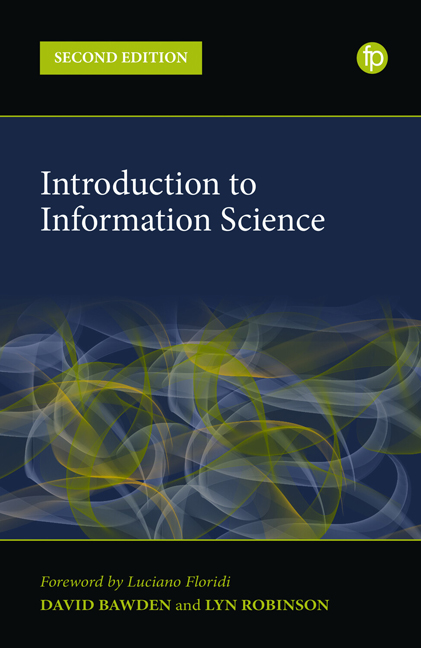Book contents
- Frontmatter
- Contents
- Figures
- Preface
- Foreword – Curators of Semantic Capital
- List of Acronyms
- 1 The Information Science Discipline
- 2 History of Information: the Story of Documents
- 3 Philosophies of Information
- 4 Paradigms, Turns and Theories in the Information Sciences
- 5 Information
- 6 Documents and Documentation
- 7 Domain Analysis
- 8 Information Organisation
- 9 Digital Technologies and Data Systems
- 10 Information Systems
- 11 Informetrics
- 12 Information Behaviour
- 13 Communicating Information: Changing Contexts
- 14 Information Management and Policy
- 15 Information Law and Ethics
- 16 Information Society
- 17 Digital (Onlife) Literacies
- 18 Research in the Information Sciences
- 19 The Future of the Information Sciences
- Additional Resources
- Index
19 - The Future of the Information Sciences
Published online by Cambridge University Press: 21 April 2022
- Frontmatter
- Contents
- Figures
- Preface
- Foreword – Curators of Semantic Capital
- List of Acronyms
- 1 The Information Science Discipline
- 2 History of Information: the Story of Documents
- 3 Philosophies of Information
- 4 Paradigms, Turns and Theories in the Information Sciences
- 5 Information
- 6 Documents and Documentation
- 7 Domain Analysis
- 8 Information Organisation
- 9 Digital Technologies and Data Systems
- 10 Information Systems
- 11 Informetrics
- 12 Information Behaviour
- 13 Communicating Information: Changing Contexts
- 14 Information Management and Policy
- 15 Information Law and Ethics
- 16 Information Society
- 17 Digital (Onlife) Literacies
- 18 Research in the Information Sciences
- 19 The Future of the Information Sciences
- Additional Resources
- Index
Summary
And little he knew of the things that ink may do, how it can mark a dead man's thoughts for the wonder of later years, and tell of happenings that are gone clear away, and be a voice for us out of the dark of time, and save many a fragile thing from the pounding of heavy ages; or carry to us, over the rolling centuries, even a song from lips long dead on forgotten hills.
Lord Dunsany, The King of Elfland's Daughter (1924)Prediction is very difficult, especially about the future.
Robert Storm Petersen, Danish poet and philosopher – also attributed to the physicist Niels BohrIntroduction
In this final chapter we give an overview of some ideas about the future of the discipline and profession of information science. This has been a source of debate almost since the beginnings of the discipline, and of its sibling, library science. Much of the debate has been negative, with a narrative around disciplines and professions permanently in crisis. And, indeed, if one worries about the structure of academic departments and the names of professional associations one might find cause for concern. If one takes a longer view and thinks, with Lord Dunsany, about the power of recorded information and the continuing need for disciplines and professions to deal with it, the concerns come into better focus.
Predicting and prophesying
Karl Popper distinguished between prediction, when sufficient knowledge is available to make reasonable conclusions about future events, and prophecy, when statements are made about the future without the necessary knowledge being available for them to be rational or realistic. We have seen examples of both of these relating to information science, but, because of the great and rapid changes in the information environment, most fall under the heading of prophesy, and much of it bad prophesy. David Deutsch (2011) builds on Popper's view to argue that the continuous development of knowledge of all kinds reduces all speculation about the future to prophesy, and almost inevitably in error.
Arthur C. Clarke, writer of popular science books and science fiction novels and originator of the concept of the communications satellite, identified two general problems in predicting the future.
- Type
- Chapter
- Information
- Introduction to Information Science , pp. 371 - 376Publisher: FacetPrint publication year: 2022



